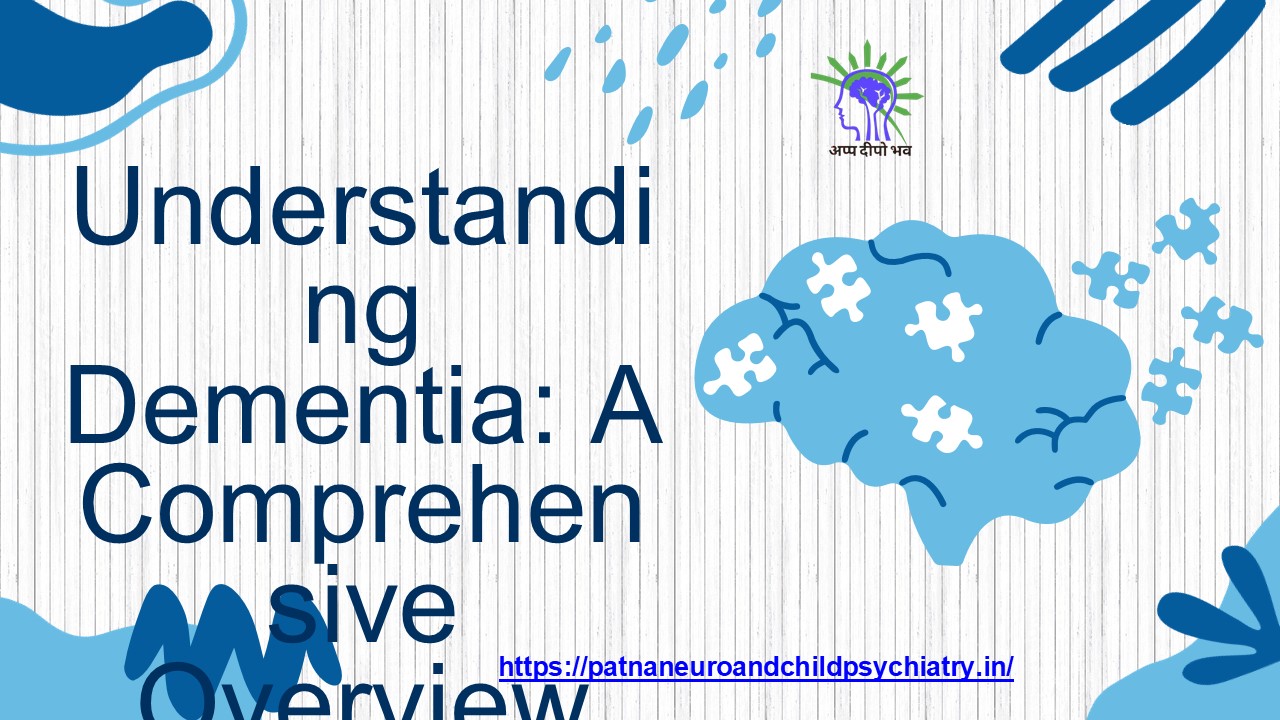Dementia Demystified: Expert Insights from a Neuropsychiatrist in Patna - PowerPoint PPT Presentation
Title:
Dementia Demystified: Expert Insights from a Neuropsychiatrist in Patna
Description:
Explore 'Dementia Demystified: Expert Insights from a Neuropsychiatrist in Patna,' a comprehensive presentation that delves into the complexities of dementia. Gain valuable knowledge on the causes, symptoms, and treatment options from a leading neuropsychiatrist. This presentation aims to enhance understanding, provide practical advice for caregivers, and foster awareness about dementia in the community. Join us to uncover the latest insights and strategies for managing this challenging condition. – PowerPoint PPT presentation
Number of Views:1
Title: Dementia Demystified: Expert Insights from a Neuropsychiatrist in Patna
1
Understanding Dementia A Comprehensive Overview
https//patnaneuroandchildpsychiatry.in/
2
Learning Points
What Is Dementia?
Coping Strategies
Symptoms
Treatment Options
Types
Causes
Diagnosis
3
https//patnaneuroandchildpsychiatry.in/
What is dementia?
Dementia is a syndrome, not a specific disease.
It involves a decline in cognitive function. This
decline is beyond what might be expected from
normal aging.
4
- Alzheimers
The leading cause of dementia.
Symptoms
- Memory problems
- Language issues
- Reasoning difficulties
- Mood changes
5
2. Vascular Dementia
Such as strokes or reduced blood flow to the
brain.
Symptoms
- Problem solving issues
- Slower thought speed
- Concentration difficulties
- Issues following tasks
6
3. Brain Injuries
Traumatic brain injuries can lead to cognitive
decline.
In some cases, dementia may be reversible if the
underlying cause is treated.
7
4. Infections
HIV/AIDS Causes some memory loss, making it hard
to create new memories.
Syphilis Can hurt the nervous system if not
treated, and problems can stay even after tests
show no infection.
Meningitis An infection that causes swelling in
the brain and/or spinal cord.
8
Symptoms Of Dementia
- Memory loss, particularly forgetting recent
events or conversations. - Difficulty communicating or finding the right
words. - Impaired reasoning or judgment, leading to poor
decision-making. - Changes in mood or behavior, such as increased
anxiety or depression. - Confusion about time or place, and difficulty
with familiar tasks.
9
Alzheimer's Disease
The most common type, characterized by plaques
and tangles in the brain.
10
Vascular Dementia
Caused by reduced blood flow to the brain, often
after a stroke.
11
Lewy Body Dementia
1 in 10 people with dementia have Lewy body
dementia.
Involves abnormal protein deposits (Lewy bodies)
in the brain.
12
Frontotemporal Dementia
Affects the frontal and temporal lobes, leading
to personality changes.
13
Diagnosis of Dementia
Diagnosis involves a comprehensive evaluation.
This includes medical history, physical and
neurological exams, cognitive tests, and brain
imaging. These tools help determine the type and
extent of dementia.
14
Treatment Options
Treatment aims to control symptoms and make life
better. Medicines can help with memory and
thinking. Therapies can improve daily skills.
Support care is important for both patients and
their families.
15
Coping Strategies
Establish Routine Create a predictable daily
schedule.
Simplify Tasks Break down complex activities.
Communication Use clear, simple language.
Safety First Ensure a safe home environment.
16
Conclusion
Understanding dementia is crucial for early
detection and effective management. By
recognizing the symptoms, types, and causes, we
can better support those affected by this
condition. Thank you for your attention, and I
hope this presentation has provided valuable
insights into dementia.
https//patnaneuroandchildpsychiatry.in/































